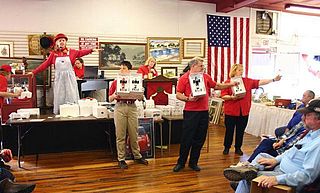
An auction is a process of buying and selling goods or services by offering them up for bid, taking bids, and then selling the item to the highest bidder. The open ascending price auction is arguably the most common form of auction in use today. Participants bid openly against one another, with each subsequent bid required to be higher than the previous bid. An auctioneer may announce prices, bidders may call out their bids themselves, or bids may be submitted electronically with the highest current bid publicly displayed. In a Dutch auction, the auctioneer begins with a high asking price for some quantity of like items; the price is lowered until a participant is willing to accept the auctioneer's price for some quantity of the goods in the lot or until the seller's reserve price is met. While auctions are most associated in the public imagination with the sale of antiques, paintings, rare collectibles and expensive wines, auctions are also used for commodities, livestock, radio spectrum and used cars. In economic theory, an auction may refer to any mechanism or set of trading rules for exchange.
In law, conveyancing is the transfer of legal title of real property from one person to another, or the granting of an encumbrance such as a mortgage or a lien. A typical conveyancing transaction has two major phases: the exchange of contracts and completion.
A real estate broker, real estate agent or realtor is a person who represents sellers or buyers of real estate or real property. While a broker may work independently, an agent usually work under a licensed broker to represent clients. Brokers and agents are licensed by the state to negotiate sales agreements and manage the documentation required for closing real estate transactions. In North America, some brokers and agents are members of the National Association of Realtors (NAR), the largest trade association for the industry. NAR members are obligated by a code of ethics that go above and beyond state legal requirements to work in the best interest of the client. Buyers and sellers are generally advised to consult a licensed real estate professional for a written definition of an individual state's laws of agency, and many states require written disclosures to be signed by all parties outlining the duties and obligations.
A straw purchase or nominee purchase is any purchase wherein an agent agrees to acquire a good or service for someone who is unable or unwilling to purchase the good or service themselves, and the agent transfers the goods or services to that person after purchasing them. In general, straw purchases are legal except in cases where the ultimate receiver of goods or services uses those goods or services in the commission of a crime with the prior knowledge of the straw purchaser, or if the ultimate possessor is not legally able to purchase the goods or services.
The law of agency is an area of commercial law dealing with a set of contractual, quasi-contractual and non-contractual fiduciary relationships that involve a person, called the agent, that is authorized to act on behalf of another to create legal relations with a third party. Succinctly, it may be referred to as the equal relationship between a principal and an agent whereby the principal, expressly or implicitly, authorizes the agent to work under his or her control and on his or her behalf. The agent is, thus, required to negotiate on behalf of the principal or bring him or her and third parties into contractual relationship. This branch of law separates and regulates the relationships between:
Title insurance is a form of indemnity insurance predominantly found in the United States and Canada which insures against financial loss from defects in title to real property and from the invalidity or unenforceability of mortgage loans. Unlike some land registration systems in countries outside the United States, US states' recorders of deeds generally do not guarantee indefeasible title to those recorded titles. Title insurance will defend against a lawsuit attacking the title or reimburse the insured for the actual monetary loss incurred up to the dollar amount of insurance provided by the policy.

A timeshare is a property with a divided form of ownership or use rights. These properties are typically resort condominium units, in which multiple parties hold rights to use the property, and each owner of the same accommodation is allotted their period of time. The minimum purchase is a one-week ownership, and the high-season weeks demand higher prices. Units may be sold as a partial ownership, lease, or "right to use", in which case the latter holds no claim to ownership of the property. The ownership of timeshare programs is varied, and has been changing over the decades.
A hire purchase (HP), known as installment plan in North America, is an arrangement whereby a customer agrees to a contract to acquire an asset by paying an initial installment and repays the balance of the price of the asset plus interest over a period of time. Other analogous practices are described as closed-end leasing or rent to own.
Procurement is the process of finding and agreeing to terms, and acquiring goods, services, or works from an external source, often via a tendering or competitive bidding process.
Gazumping occurs when a seller accepts a verbal offer on the property from one potential buyer, but then accepts a higher offer from someone else. It can also refer to the seller raising the asking price or asking for more money at the last minute, after previously verbally agreeing to a lower one. In either case, the original buyer is left in a bad situation, and either has to offer a higher price or lose the purchase. The term gazumping is most commonly used in the UK, Ireland and Australia, although similar practices can be found in some other jurisdictions.
Equity sharing is another name for shared ownership or co-ownership. It takes one property, more than one owner, and blends them to maximize profit and tax deductions. Typically, the parties find a home and buy it together as co-owners, but sometimes they join to co-own a property one of them already owns. At the end of an agreed term, they buy one another out or sell the property and split the equity.
Business brokers, also called business transfer agents, or intermediaries, assist buyers and sellers of privately held businesses in the buying and selling process. They typically estimate the value of the business; advertise it for sale with or without disclosing its identity; handle the initial potential buyer interviews, discussions, and negotiations with prospective buyers; facilitate the progress of the due diligence investigation and generally assist with the business sale.
Creative real estate investing is any non-traditional method of buying and selling real estate. Confidence tricks and pyramid schemes in the 20th and 21st century such as Nouveau Riche have embraced the term, leading contemporary usage of the term to be synonymous with unscrupulous practices.
A dummy corporation,dummy company, or false company is an entity created to serve as a front or cover for one or more companies. It can have the appearance of being real, but lacks the capacity to function independently. The dummy corporation's sole purpose is to protect "an individual or another corporation from liability in either contract or import".
A buyer brokerage or buyer agency is the practice of real estate brokers and their agents representing a buyer in a real estate transaction rather than, by default, representing the seller either directly or as a sub-agent. In the United Kingdom and Australia, the most common term is buying agent.
A straw owner is a person who owns property legally or has the legal appearance of owning something but does so on behalf of another, sometimes for a fee, and typically solely to hide the identity of the effective owner. Most instances of straw ownership are legal, but the arrangement is sometimes made for nefarious, illegal purposes.
Buying agents or purchasing agents are people or companies that offer to buy goods or property on behalf of another party. Indent agents or indenting agents are alternative terms for buying agents. An indent is an order for goods under specified conditions of sale.
Off-plan property is a property before a structure has been constructed upon it. Pre-constructions are usually marketed to real estate developers and to early adopters as developments so that the purchaser can secure more favorable finance terms from their lenders.
Abramski v. United States, 573 U.S. ___ (2014), was a United States Supreme Court case in which the Court found that making arrangements for a straw purchase of a gun is in violation of the Gun Control Act of 1968, and is different from re-selling or gifting a previously purchased gun. In the Abramski case, a former police officer from Virginia took advantage of a local discount to buy a gun for his uncle and later transferred it to Pennsylvania—the uncle's residence—using the appropriate federal procedure. During the purchase, Abramski falsely declared that he is purchasing the gun for himself.


